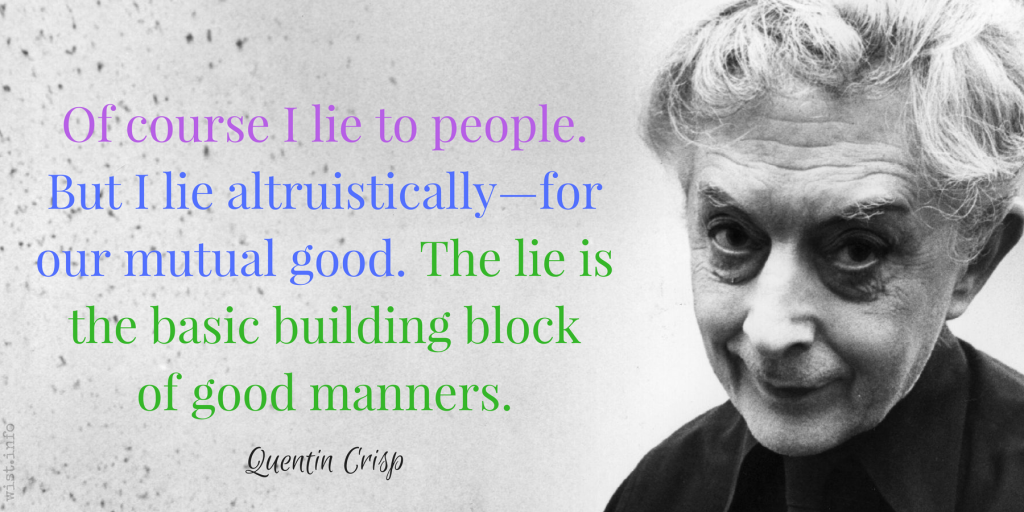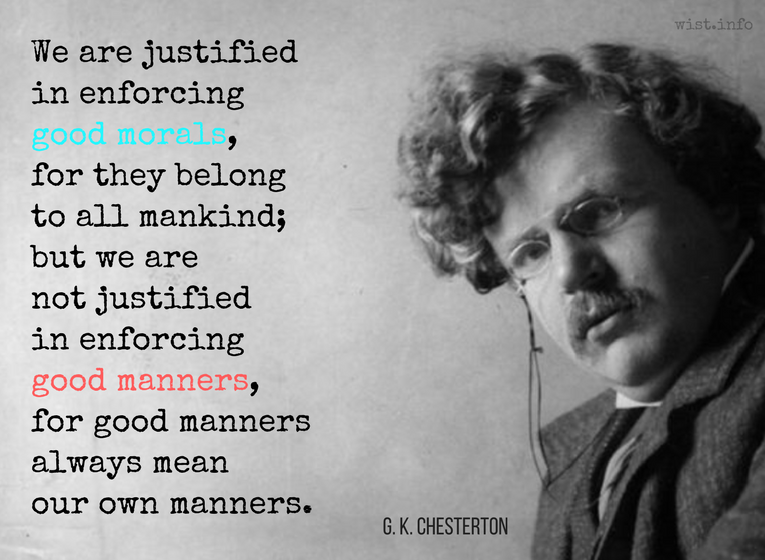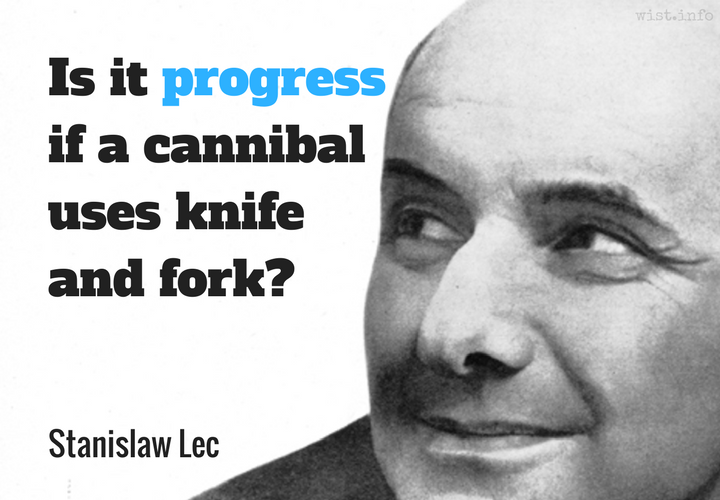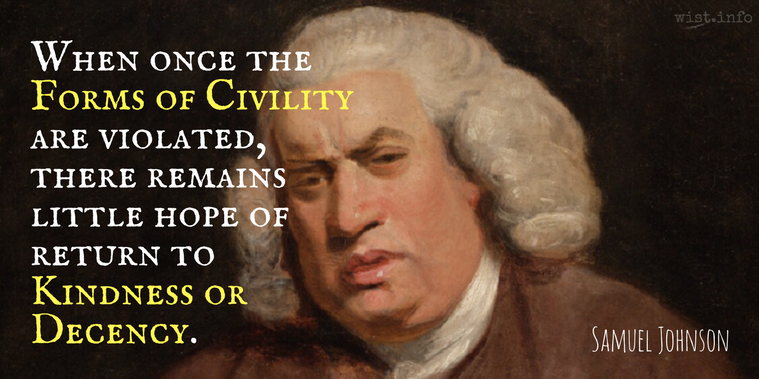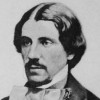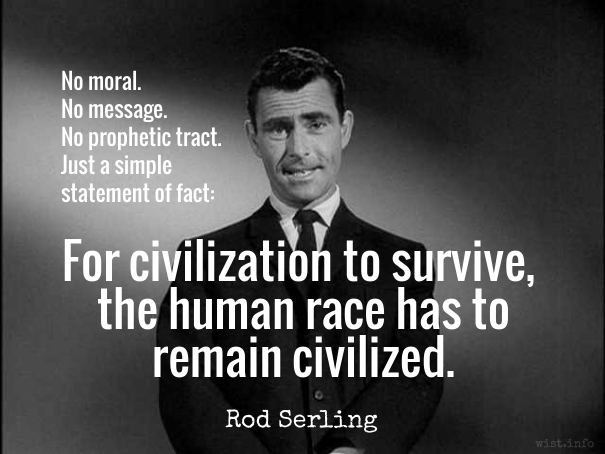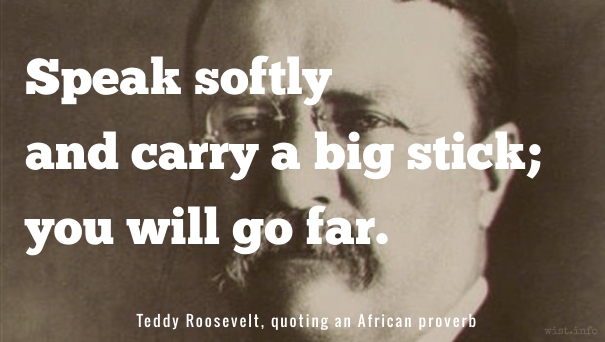Quotations about:
politeness
Note not all quotations have been tagged, so Search may find additional quotes on this topic.
Good manners are made up of petty sacrifices.
Ralph Waldo Emerson (1803-1882) American essayist, lecturer, poet
“Social Aims,” lecture, Boston (1864-12-04), Letters and Social Aims (1875)
(Source)
Of course I lie to people. But I lie altruistically — for our mutual good. The lie is the basic building block of good manners. That may seem mildly shocking to a moralist — but then what isn’t?
Quentin Crisp (1908-1999) English writer and raconteur [b. Denis Pratt]
Manners from Heaven: A Divine Guide to Good Behavior (1984)
(Source)
We are justified in enforcing good morals, for they belong to all mankind; but we are not justified in enforcing good manners, for good manners always mean our own manners.
Gilbert Keith Chesterton (1874-1936) English journalist and writer
All Things Considered, “Limericks and Counsels of Perfection” (1908)
(Source)
Good general-purpose manners nowadays may be said to consist in knowing how much you can get away with.
Again, it is proper to the magnanimous person to ask for nothing, or hardly anything, but to help eagerly. When he meets people with good fortune or a reputation for worth, he displays his greatness, since superiority over them is difficult and impressive, and there is nothing ignoble in trying to be impressive with them. But when he meets ordinary people, he is moderate, since superiority over them is easy, and an attempt to be impressive among inferiors is as vulgar as a display of strength against the weak.
[μεγαλοψύχου δὲ καὶ τὸ μηδενὸς δεῖσθαι ἢ μόλις, ὑπηρετεῖν δὲ προθύμως, καὶ πρὸς μὲν τοὺς ἐν ἀξιώματι καὶ εὐτυχίαις μέγαν εἶναι, πρὸς δὲ τοὺς μέσους μέτριον: τῶν μὲν γὰρ ὑπερέχειν χαλεπὸν καὶ σεμνόν, τῶν δὲ ῥᾴδιον, καὶ ἐπ᾽ ἐκείνοις μὲν σεμνύνεσθαι οὐκ ἀγεννές, ἐν δὲ τοῖς ταπεινοῖς φορτικόν, ὥσπερ εἰς τοὺς ἀσθενεῖς ἰσχυρίζεσθαι.]
Aristotle (384-322 BC) Greek philosopher
Nicomachean Ethics [Ἠθικὰ Νικομάχεια], Book 4, ch. 3 (4.3.26) / 1124b.18 (c. 325 BC) [tr. Irwin (1999)]
(Source)
The core word Aristotle is using is μεγαλοψυχία (translated variously as high-mindedness, great-mindedness, pride, great-soulness, magnanimity). (Source (Greek)). Alternate translations:
Further, it is characteristic of the Great-minded man to ask favours not at all, or very reluctantly, but to do a service very readily; and to bear himself loftily towards the great or fortunate, but towards people of middle station affably; because to be above the former is difficult and so a grand thing, but to be above the latter is easy; and to be high and mighty towards the former is not ignoble, but to do it towards those of humble station would be low and vulgar; it would be like parading strength against the weak.
[tr. Chase (1847)]
It would seem, too, that the high-minded man asks favours of no one, or, at any rate, asks them with the greatest reluctance, but that he is always eager to do good offices to others; and that towards those in high position and prosperity he bears himself with pride, but towards ordinary men with moderation; for in the former case it is difficult to show superiority, and to do so is a lordly mater; whereas in the latter case it is easy. To be haughty among the great is no proof of bad breeding, but haughtiness among the lowly is as base-born a thing as it is to make trial of great strength upon the weak.
[tr. Williams (1869)]
It is characteristic too of the high-minded man that he never, or hardly ever, asks a favor, that he is ready to do anybody a service, and that, although his bearing is stately towards person of dignity and affluence, it is unassuming toward the middle class; for while it is a difficult and dignified thing to be superior to the former, it is easy enough to be superior to the latter, and while a dignified demeanour in dealing with the former is a mark of nobility, it is a mark of vulgarity ind ealing with the latter, as it like a display of physical strength at the expense of an invalid.
[tr. Welldon (1892), ch. 8]
It is characteristic of the high-minded man, again, never or reluctantly to ask favours, but to be ready to confer them, and to be lofty in his behaviour to those who are high in station and favoured by fortune, but affable to those of the middle ranks; for it is a difficult thing and a dignified thing to assert superiority over the former, but easy to assert it over the latter. A haughty demeanour in dealing with the great is quite consistent with good breeding, but in dealing with those of low estate is brutal, like showing off one’s strength upon a cripple.
[tr. Peters (1893)]
It is a mark of the proud man also to ask for nothing or scarcely anything, but to give help readily, and to be dignified towards people who enjoy high position and good fortune, but unassuming towards those of the middle class; for it is a difficult and lofty thing to be superior to the former, but easy to be so to the latter, and a lofty bearing over the former is no mark of ill-breeding, but among humble people it is as vulgar as a display of strength against the weak.
[tr. Ross (1908)]
It is also characteristic of the great-souled man never to ask help from others, or only with reluctance, but to render aid willingly; and to be haughty towards men of position and fortune, but courteous towards those of moderate station, because it is difficult and distinguished to be superior to the great, but easy to outdo the lowly, and to adopt a high manner with the former is not ill-bred, but it is vulgar to lord it over humble people: it is like putting forth one's strength against the weak.
[tr. Rackham (1934)]
It is also characteristic of a great-souled person to ask for nothing or hardly anything but to offer his services eagerly, and to exhibit his greatness to those with a reputation for great worth or those who are enjoying good luck, but to moderate his greatness to those in the middle. For it is a difficult and a dignified thing to show oneself superior to the former, but an easy one to do so to the latter, and, while adopting a dignified manner toward the former is not ill-bred, to do so toward humble people is vulgar, like displaying strength against the weak.
[tr. Reeve (1948)]
It is the mark of a high-minded man, too, never, or hardly ever, to ask for help, but to be of help to others readily, and to be dignified with men of high position or of good fortune, but unassuming with those of middle class, for it is difficult and impressive to be superior to the former, but easy to be so to the latter; and whereas being impressive to the former is not a mark of a lowly man, being so to the humble is crude -- it is like using physical force against the physically weak.
[tr. Apostle (1975)]
Another mark of the magnanimous man is that he never, or only reluctantly, makes a request, whereas he is eager to help others. He his haughty toward those who are influential and successful, but moderate toward those who have an intermediate position in society, because in the former case to be superior is difficult and impressive, but in the latter it is easy' and to create an impression at the expense of the former is not ill-bred, but to do so among the humble is vulgar.
[tr. Thomson/Tredennick (1976)]
It is also characteristic of a great-souled person to ask for nothing, or almost nothing, but to help others readily; and to be dignified in his behavior towards people of distinction or the well-off, but unassuming toward people at the middle level. Superiority over the first group is difficult and impressive, but over the second it is easy, and attempting to impress the first group is not ill-bred, while in the case of humble people it is vulgar, like a show of strength against the weak.
[tr. Crisp (2000)]
It belongs to the great-souled also to need nothing, or scarcely anything, but to be eager to be of service, and to be great in the presence of people of worth and good fortune, but measured toward those of a middling rank. For it is a difficult and august thing to be superior among the fortunate, but easy to be that way among the middling sorts; and to exalt oneself among the former is not a lowborn thing, but to do so among the latter is crude, just as is using one's strength against the weak.
[tr. Bartlett/Collins (2011)]
Sometimes paraphrased:
It is not ill-bred to adopt a high manner with the great and the powerful, but it is vulgar to lord it over humble people.
For to be civilized is to be incapable of giving unnecessary offense, it is to have some quality of consideration for all who cross our path.
Agnes Repplier (1855-1950) American writer
“A Question of Politeness,” Americans and Others (1912)
(Source)
Civility costs nothing, and buys everything.
Mary Wortley Montagu (1689-1762) English aristocrat, letter writer, poet [née Pierrepont]
Letter to Mary, Countess of Bute (30 May 1756)
(Source)
The waiter returned with Ronni’s bourbon. She drank it while he explained about the specials. The explanation took a while and I wondered, as I always did when people recited a menu at me, what I was supposed to do while they did it. To just sit and nod wisely made me feel like a talk show host. To get up and go to the men’s room seemed rude. Once in Chicago I had tried taking notes in the margin of the menu, but they got mad at me.
“Why now,” said Tazendra. “There is an idea. What do you think of Kytraan’s idea, Piro?”
“It is one I had not thought of,” admitted Piro.
“And do you think it a good one?” said Kytraan.
“I must consider it.”
“Oh,” said Tazendra, “we have nothing against considering.”
“No, indeed,” said Kytraan. “I, myself, have been known to consider on occasion, and would scarcely begrudge another’s chance to consider.”
“That is good, then; I will do so.”
“And will you do so now?” said Tazendra.
“I am considering this very instant,” said Piro. .
“That is good,” said Kytraan.
“Yes. I could not tell, or I should not have asked,” said Tazendra.
“Then it is right that you asked.”
“Do you think so?”
“I am certain of it.”
“Well, then I am pleased.”
“And you should be. But, your pardon, I am considering.”
“Of course,” said Tazendra, falling silent.
Is it progress if a cannibal uses knife and fork?
[Czy jeżeli ludożerca je widelcem i nożem to postęp?]
Stanislaw Lec (1909-1966) Polish aphorist, poet, satirist
Unkempt Thoughts [Myśli nieuczesane] (1957) [tr. Gałązka (1962)]
(Source)
If a civil word or two will render a man happy, he must be a wretch indeed who will not give them to him.
Louis XIV (1638-1715) French monarch (1643-1715) [Louis the Great, the Sun King)
(Attributed)
(Source)
Quoted in William Seward, Anecdotes of Distinguished Persons, Vol 4, 5th ed. (1804).
When once the forms of civility are violated, there remains little hope of return to kindness or decency.
Samuel Johnson (1709-1784) English writer, lexicographer, critic
The Rambler, #50 (25 Sep 1750)
(Source)
Couched as a letter to the paper from a woman.
But remember that talking is one of the fine arts — the noblest, the most important, the most difficult — and its fluent harmonies may be spoiled by the intrusion of a single harsh note. Therefore conversation which is suggestive rather than argumentative, which lets out the most of each talker’s results of thought, is commonly the pleasantest and the most profitable.
Moving parts in rubbing contact require lubrication to avoid excessive wear. Honorifics and formal politeness provide lubrication where people rub together. Often the very young, the untraveled, the naive, the unsophisticated deplore these formalities as “empty,” “meaningless,” or “dishonest,” and scorn to use them. No matter how “pure” their motives, they thereby throw sand into machinery that does not work too well at best.
If we use no ceremony towards others, we shall be treated without any. People are soon tired of paying trifling attentions to those who receive them with coldness, and return them with neglect.
Tact is the art of putting your foot down without stepping on anyone’s toes.
Lawrence J. Peter (1919-1990) American educator, management theorist
Peter’s Almanac, “July 26” (1982)
(Source)
“Okay,” I said to Teldra. “Look. I’ll concede that, over the years, I’ve learned that there’s no point in making a bad situation worse, and that it’s less work to talk yourself out of a tough spot than to slice your way out, and that words, while potentially deadly, are less deadly than Morganti daggers. But I don’t think that is quite the same thing as being courteous.”
“I believe, Lord Taltos, that it is very much the same thing.”
NARRATOR: No moral. No message. No prophetic tract. Just a simple statement of fact: for civilization to survive, the human race has to remain civilized. Tonight’s very small exercise in logic from the Twilight Zone.
This sad little lizard told me that he was a Brontosaurus on his mother’s side. I did not laugh; people who boast of ancestry often have little else to sustain them. Humoring them costs nothing and adds to happiness in a world in which happiness is in short supply.
All Politeness is owing to Liberty. We polish one another, and rub off our Corners and rough Sides by a sort of amicable Collision. To restrain this, is inevitably to bring a Rust upon Men’s Understandings.
Respectfulness, without the rules of propriety, becomes laborious bustle; carefulness, without the rules of propriety, becomes timidity; boldness, without the rules of propriety, becomes insubordination; straightforwardness, without the rules of propriety, becomes rudeness.
[恭而無禮則勞、愼而無禮則葸、勇而無禮則亂、直而無禮則絞。]
Confucius (c. 551- c. 479 BC) Chinese philosopher, sage, politician [孔夫子 (Kǒng Fūzǐ, K'ung Fu-tzu, K'ung Fu Tse), 孔子 (Kǒngzǐ, Chungni), 孔丘 (Kǒng Qiū, K'ung Ch'iu)]
The Analects [論語, 论语, Lúnyǔ], Book 8, verse 2 (8.2.1) (6th C. BC – AD 3rd C.) [tr. Legge (1861)]
(Source)
(Source (Chinese)). Brooks (below) believes this text was interpolated into Book 8 at the time that Book 14 was collected. Alternate translations:
Without the Proprieties, we have these results: for deferential demeanour, a worried one; for calm attentiveness, awkward bashfulness; for manly conduct, disorderliness; for straightforwardness, perversity.
[tr. Jennings (1895)]
Earnestness without judgment becomes pedantry; caution without judgment becomes timidity; courage without judgment leads to crime; uprightness without judgment makes men tyrannical.
[tr. Ku Hung-Ming (1898)]
Courtesy uncontrolled by the laws of good taste becomes labored effort, caution uncontrolled becomes timidity, boldness uncontrolled becomes recklessness, and frankness uncontrolled become effrontery.
[tr. Soothill (1910)]
Respect without rules of procedure becomes laborious fuss: scrupulosity without rules of procedure, timidity (fear to show the thought); boldness without such rules breeds confusion; directness without rules of procedure becomes rude.
[tr. Pound (1933)]
Courtesy not bounded by the prescriptions of ritual becomes tiresome. Caution not bounded by the prescriptions of ritual becomes timidity, daring becomes turbulence, inflexibility becomes harshness.
[tr. Waley (1938)]
Not to follow the rites in being modest is annoyance. Not to follow them in exercising care is timidity. Not to follow them in acts of bravery is confusion. Not to follow them in our uprightness is brusqueness.
[tr. Ware (1950)]
Unless a man has the spirit of the rites, in being respectful he will wear himself out, in being careful he will become timid, in having courage he will become unruly, and in being forthright he will become intolerant.
[tr. Lau (1979)]
If one is courteous but does without ritual, then one dissipates one's energies; if one is cautious but does without ritual, then one becomes timid; if one is bold but does without ritual, then one becomes reckless; if one is forthright but does without ritual, then one becomes rude.
[tr. Dawson (1993)]
Without ritual, courtesy is tiresome; without ritual, prudence is timid; without ritual, bravery is quarrelsome; without ritual, frankness is hurtful.
[tr. Leys (1997)]
Respectfulness without the rituals becomes laboriousness; discretion without the rituals becomes apprehensiveness; courage without the rituals becomes rebelliousness; straightforwardness without the rituals becomes impetuosity.
[tr. Huang (1997)]
One would be tired if one is humble but not polite; One would be week if one is cautious but not polite; One would be foolhardy if one is brave but not polite; One would be caustic if one is frank but not polite.
[tr. Cai/Yu (1998), #190]
Deference unmediated by observing ritual propriety [li] is lethargy; caution unmediated by observing ritual propriety is timidity; boldness unmediated by observing ritual propriety is rowdiness; candor unmediated by observing ritual propriety is rudeness.
[tr. Ames/Rosemont (1998)]
If he is respectful without propriety, he becomes wearisome. If he is careful without propriety, he becomes finicky. If he is brave without propriety, he becomes disruptive. If he is upright without propriety, he becomes censorious.
[tr. Brooks/Brooks (1998)]
Reverence becomes tedium without Ritual, and caution becomes timidity. Without Ritual, courage becomes recklessness, and truth becomes intolerance.
[tr. Hinton (1998)]
If you are respectful but lack ritual you will become exasperating; if you are careful but lack ritual you will become timid; if you are courageous but lack ritual you will become unruly; and if you are upright but lack ritual you will become inflexible.
[tr. Slingerland (2003)]
Courtesy without ritual becomes labored; caution without ritual becomes timidity; daring without ritual becomes riotousness; directness without ritual becomes obtrusiveness.
[tr. Watson (2007)]
Unless a man acts according to the spirit of the rites, in being respectful, he will tire himself out; in being cautious, he will become timid; in being brave, he will become unruly; in being forthright, he will become derisive.
[tr. Chin (2014)]
I have always been fond of the West African proverb “Speak softly and carry a big stick; you will go far.”
Theodore Roosevelt (1858-1919) American politician, statesman, conservationist, writer, US President (1901-1909)
Letter to Henry L. Sprague (26 Jan 1900)
Full text. This is the first known use by Roosevelt of his future catch phrase. It attained more fame when he used it in a speech at the Minnesota State Fair (2 Sep 1901) (there are transcript variants):
More discussion here:
- "There is a homely adage which runs 'Speak softly and carry a big stick; you will go far.' If the American nation will speak softly and yet build and keep at a pitch of highest training a thoroughly efficient Navy, the Monroe Doctrine will go far."
- "Right here let me make as vigorous a plea as I know how in favor of saying nothing that we do not mean, and of acting without hesitation up to whatever we say. A good many of you are probably acquainted with the old proverb, 'Speak softly and carry a big stick -- you will go far.' If a man continually blusters, if he lacks civility, a big stick will not save him from trouble, and neither will speaking softly avail, if back of the softness there does not lie strength, power. In private life there are few beings more obnoxious than the man who is always loudly boasting, and if the boaster is not prepared to back up his words, his position becomes absolutely contemptible. So it is with the nation. It is both foolish and undignified to indulge in undue self-glorification, and, above all, in loose-tongued denunciation of other peoples. Whenever on any point we come in contact with a foreign power, I hope that we shall always strive to speak courteously and respectfully of that foreign power."
A Man that should call everything by its right Name, would hardly pass the Streets without being knock’d down as a common Enemy.
George Savile, Marquis of Halifax (1633-1695) English politician and essayist
“Of Caution and Suspicion,” Political, Moral and Miscellaneous Thoughts and Reflections (1750)
(Source)
BRUTUS: When love begins to sicken and decay
It useth an enforcèd ceremony.William Shakespeare (1564-1616) English dramatist and poet
Julius Caesar, Act 4, sc. 2, l. 23ff (4.2.23-24) (1599)
(Source)
It hurteth not the toung to give faire words.
John Heywood (1497?-1580?) English playwright and epigrammist
Proverbes, Part 1, ch. 9 (1546)
(Source)
If a man be gracious and courteous to strangers, it shows he is a citizen of the world, and that his heart is no island cut off from other lands, but a continent that joins to them.
Francis Bacon (1561-1626) English philosopher, scientist, author, statesman
“Of Goodness, and Goodness of Nature,” Essays, No. 13 (1625)
(Source)
So let us begin anew — remembering on both sides that civility is not a sign of weakness, and sincerity is always subject to proof. Let us never negotiate out of fear. But let us never fear to negotiate.
We must respect the other fellow’s religion, but only in the sense and to the extent that we respect his theory that his wife is beautiful and his children are smart.
H. L. Mencken (1880-1956) American writer and journalist [Henry Lewis Mencken]
Minority Report: H.L. Mencken’s Notebooks, # 1 (1956)
(Source)
People who like this sort of thing will find this the sort of thing they like.
Abraham Lincoln (1809-1865) American lawyer, politician, US President (1861-65)
(Attributed)
One of the earliest references to something like this was in an 1863 newspaper ad for Lincoln’s favorite humorist, Artemus Ward, that included this faux testimonial (possibly written by Ward): “I have never heard any of your lectures, but from what I can learn I should say that for people who like the kind of lectures you deliver, they are just the kind of lectures such people like. Yours respectfully, O. Abe.”
Quoted in G.W.E. Russell, Collections and Recollections, ch. 30 (1898), regarding “an unreadably sentimental book.”
According to Anthony Gross, Lincoln’s Own Stories (1902), Lincoln’s was speaking to Robert Dale Owen, who had insisted on reading to Lincoln a long manuscript on spiritualism. "Well, for those who like that sort of thing, I should think it is just about the sort of thing they would like."
In Emanual Hertz, ed., "Father Abraham," Lincoln Talks: A Biography in Anecdote (1939), the response was to a young poet asking him about his newly published poems.
More discussion of this quotation: Ralph Keyes, The Quote Verifier.
My friend Sir Roger heard them both upon a round trot; and after having paused some time, told them with an air of a man who would not give his judgment rashly, that “much might be said on both sides.”
Joseph Addison (1672-1719) English essayist, poet, statesman
The Spectator, #122 (20 Jul 1711)
(Source)
When I am in Rome, I fast as the Romans do; when I am at Milan, I do not fast. So likewise you, whatever church you come to, observe the custom of the place.
[Cum Romanum venio, ieiuno Sabbato; cum hic sum, non ieiuno: sic etiam tu, ad quam forte ecclesiam veneris, eius morem serva, si cuiquam non vis esse scandalum nec quemquam tibi.]
Ambrose of Milan (339-397) Roman theologian, statesman, Christian prelate, saint, Doctor of the Church [Aurelius Ambrosius]
In Augustine, Epistulae, Letter 36 (c. AD 400)
Alt trans.:Various Augustine citations described:
- Popularly, "When in Rome, do as the Romans do."
- "When I am at Rome, I fast on a Saturday; when I am at Milan, I do not. Follow the custom of the church where you are."
- "When I am here, I do not fast on the Sabbath; when I am in Rome, I fast on the Sabbath."
- Alternately given as "If you are at Rome, live in the Roman style; if you are elsewhere, live as they live there. [Si fueris Romae, Romano vivito more; / Si fueris alibi, vivito sicut ibi.]" in J. Taylor, Ductor Dubitantium, or the Rule of Conscience, I.i.5 (1660).
- Epistulae 36, 14 or 32
- Letter 54 to Januarius
- Epistle to Januarius, 2, sec. 18
- Epistle to Casualanus, 36, sec. 32




